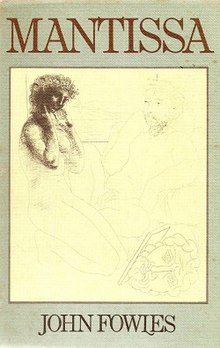Critical reception
Mantissa was Fowles' only novel to receive generally negative reviews. The New York Times called it "a surprisingly tedious novel," asserting that it was little more than Fowles' response to critics that he felt misunderstood his work. [1] The Boston Globe named it "an idiotic story." [2] Time magazine, in a more positive review, asserted that the book consists of a sort of intellectual play between Fowles and the reader, or by Fowles at the expense of all reading. [3] The Pittsburgh Post-Gazette likewise identified the book as intellectually playful but found the dialogue tiresome. [4]
Dave Langford reviewed Mantissa for White Dwarf #55, and stated that "Although packed with allegory about what creativity/inspiration actually is, the book is wonderfully, unexpectedly funny. An in-joke or so too many, but great stuff." [5]

Foundation's Edge (1982) is a science fiction novel by American writer Isaac Asimov, the fourth book in the Foundation Series. It was written more than thirty years after the stories of the original Foundation trilogy, due to years of pressure by fans and editors on Asimov to write another, and, according to Asimov himself, the amount of the payment offered by the publisher. It was his first novel to ever land on The New York Times best-seller list, after 262 books and 44 years of writing.

The Hitchhiker's Guide to the Galaxy: The Original Radio Scripts is a book, published in 1985, containing the scripts for the original radio series version of The Hitchhiker's Guide to the Galaxy by Douglas Adams. Text present in the original scripts but cut to meet time constraints are printed in italics. This book also includes explanatory footnotes, behind-the-scenes anecdotes, and forewords by Adams and by series producer Geoffrey Perkins.

The White Plague is a 1982 science fiction novel by American author, Frank Herbert that explores madness and revenge on a global scale.

John Robert Fowles was an English novelist of international renown, critically positioned between modernism and postmodernism. His work was influenced by Jean-Paul Sartre and Albert Camus, among others.

The Fowl Adventures is a series of eleven fantasy novels written by Irish author Eoin Colfer revolving around various members of the Fowl family. The first cycle, Artemis Fowl, follows elf Lower Elements Police Reconnaissance (LEPRecon) officer Holly Short as she faces the forces of criminal mastermind Artemis Fowl II, although later on in the cycle they become friends and Artemis Fowl II saves the world a few times. The second cycle received positive critical reception and generated huge sales. It has also originated graphic novel adaptations.

Eoin Colfer is an Irish author of children's books. He worked as a primary school teacher before he became a full-time writer. He is best known for being the author of the Artemis Fowl series. In September 2008, Colfer was commissioned to write the sixth installment of the Hitchhiker's Guide to the Galaxy series, titled And Another Thing ..., which was published in October 2009. In October 2016, in a contract with Marvel Comics, he released Iron Man: The Gauntlet. He served as Laureate na nÓg between 2014 and 2016.

David Rowland Langford is a British author, editor, and critic, largely active within the science fiction field. He publishes the science fiction fanzine and newsletter Ansible, and holds the all-time record for most Hugo Awards, with a total of 29 wins.

Tik-Tok is a 1983 science fiction novel by John Sladek. It received a 1983 British Science Fiction Association Award.
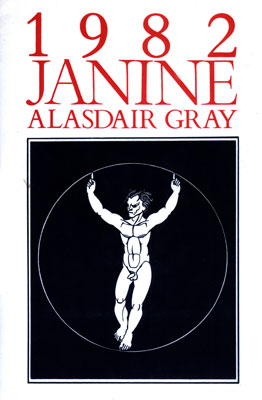
1982, Janine is a novel by the Scottish author Alasdair Gray. His second, it was published in 1984, and remains his most controversial work. Its use of pornography as a narrative device attracted much criticism, although others, including Gray himself, consider it his best work.
The Planiverse (ISBN 0-387-98916-1) is a novel by A. K. Dewdney, written in 1984.

National Lampoon's Doon is a parody of Frank Herbert's 1965 science fiction novel Dune, written by Ellis Weiner and published in 1984 by Pocket Books for National Lampoon. It was reprinted by Grafton Books (ISBN 0-586-06636-5) in 1985. In 1988 William F. Touponce called the book "something of a tribute to Herbert's success on college campuses", noting that "the only other book to have been so honored is Tolkien's The Lord of the Rings," which was parodied by The Harvard Lampoon in 1969.

High Spirits is a collection of short stories by Canadian novelist, playwright, critic, journalist and professor Robertson Davies. It was first published by Penguin Canada in 1982

Deadeye Dick is a novel by Kurt Vonnegut originally published in 1982.

Mindkiller is a 1982 science fiction novel by American writer Spider Robinson. The novel, set in the late 1980s, explores the social implications of technologies to manipulate the brain, beginning with wireheading, the use of electric current to stimulate the pleasure center of the brain in order to achieve a narcotic high.
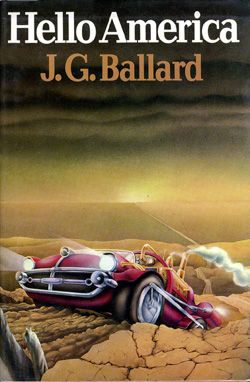
Hello America is a science fiction novel by British writer J. G. Ballard, published in 1981. First edition cover designed by Bill Botten. The plot follows an expedition to a North America rendered uninhabitable by an ecological disaster following an energy crisis.
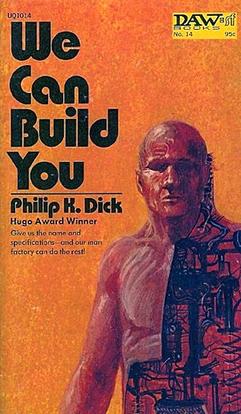
We Can Build You is a 1972 science fiction novel by American writer Philip K. Dick. Written in 1962 as The First in Our Family, it remained unpublished until appearing in serial form as A. Lincoln, Simulacrum in the November 1969 and January 1970 issues of Amazing Stories magazine, re-titled by editor Ted White. The novel was issued as a mass market paperback original by DAW Books in 1972, its final title provided by publisher Donald A. Wollheim. Its first hardcover edition was published in Italy in 1976, and Vintage issued a trade paperback in 1994.

Software is a 1982 cyberpunk science fiction novel written by Rudy Rucker. It won the first Philip K. Dick Award in 1983. The novel is the first book in Rucker's Ware Tetralogy, and was followed by a sequel, Wetware, in 1988.
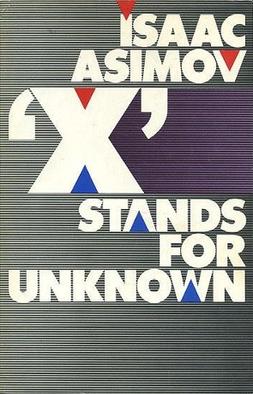
'X' Stands for Unknown is a collection of seventeen nonfiction science essays written by Isaac Asimov. It was the seventeenth of a series of books collecting essays from The Magazine of Fantasy and Science Fiction, these being first published between January 1982 and May 1983. It was first published by Doubleday & Company in 1984.

The Solitudes is a 1987 fantasy novel by John Crowley. It is Crowley's fifth published novel and the first novel in the Ægypt tetralogy. Titled after Luis de Góngora's Las Soledades, the novel follows Pierce Moffett, a college history professor in his retreat from ordinary, academic life to pastoral life of Faraway Hills. While in the area, Pierce comes up with a plan to write a book about Hermeticism, in the process finding several parallels with his own project and that of the nearly-forgotten local novelist Fellowes Kraft.
Aurelia is a novel by R. A. Lafferty published in 1982.
